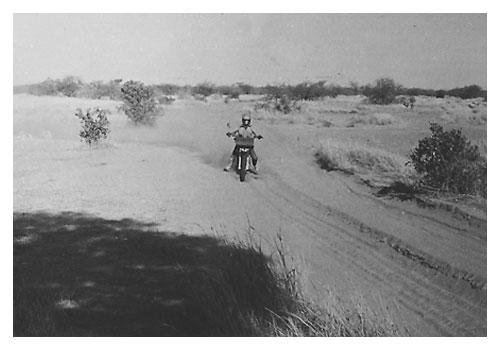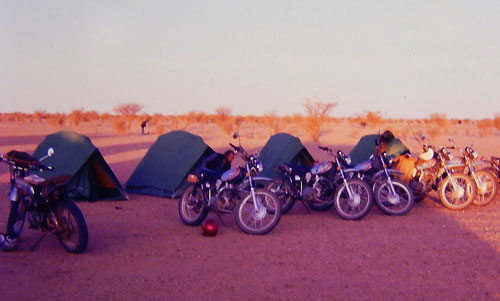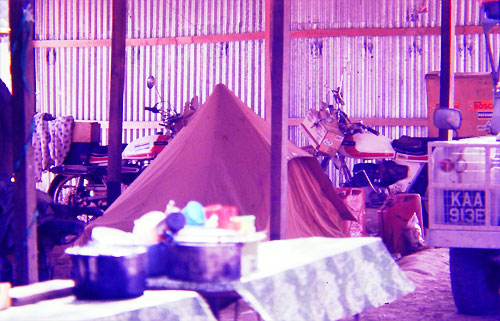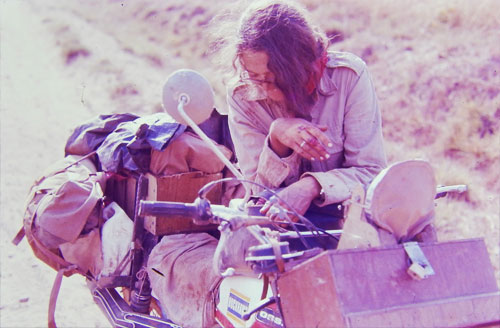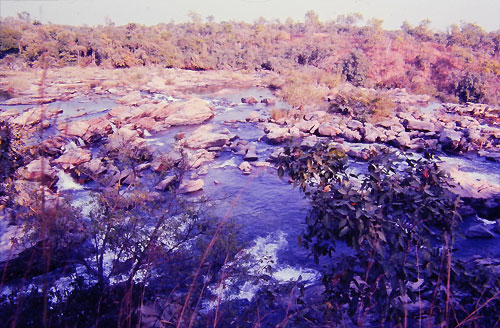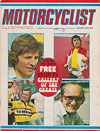
|
Motorcyclist Illustrated February, 1976
|

part 5
by Fergus & Sharyn Reilly
Southern Sahara
2258 klms
Arlit, Niger
December 18th, 1974
(day 106 - 15327 klms)
to
Gurara Falls, Nigeria
January 4th, 1975
(day 123 - 17585 klms)
|
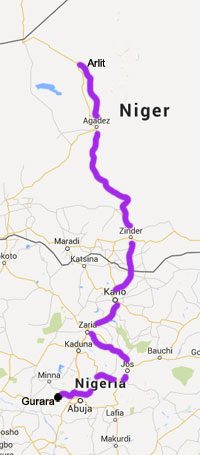
|
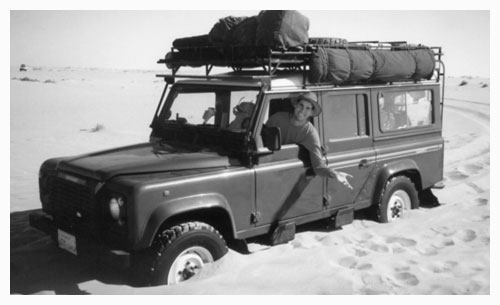 Our route circumvented the massive dune. but the sand to the edges was
thick and now in the heat of late afternoon, slippery to boot. Each
four-wheeled vehicle ground to a halt, out came the sand ladders and
everybody took turns to push, whilst we found a convenient place to park
the bikes and merely had to use our legs a little to get through sand
halfway up the wheels. One of the Land Rovers became firmly embedded in
one particularly deep patch and none of the drivers could budge it
despite roaring engine, burning clutch and multi-lingual profanities.
Fergus gingerly asked if he might have a go much to the amusement of the
French contingent - their smiles disappeared when he gently persuaded
the vehicle to ease its way out of difficulty with an idling motor and
no effort other than patience. It didn't seem to do his popularity much
good at all!
Our route circumvented the massive dune. but the sand to the edges was
thick and now in the heat of late afternoon, slippery to boot. Each
four-wheeled vehicle ground to a halt, out came the sand ladders and
everybody took turns to push, whilst we found a convenient place to park
the bikes and merely had to use our legs a little to get through sand
halfway up the wheels. One of the Land Rovers became firmly embedded in
one particularly deep patch and none of the drivers could budge it
despite roaring engine, burning clutch and multi-lingual profanities.
Fergus gingerly asked if he might have a go much to the amusement of the
French contingent - their smiles disappeared when he gently persuaded
the vehicle to ease its way out of difficulty with an idling motor and
no effort other than patience. It didn't seem to do his popularity much
good at all!
Perhaps we became to cocky, having reached the end of the bad
stretch, Fergus was riding diagonally in front of me when his front
wheel hit a truck's ruts at an angle. The bike somersaulted and Fergus
pitched over the handlebars to land squarely on the back of his head,
Luckily his helmet took the brunt and he was back on the bike, which
hadn't stopped running, before I caught up.
When we stopped at nightfall we were totally exhausted to the point
of managing only to eat a tin of sardines and then fall flat on the sand
to watch the sunset and dream of the fresh bread waiting in Arlit.
|
|
We reached Arlit without a
hitch - miraculous! After a race with a pack of donkeys we suddenly
found ourselves in a maze of roundabouts and two-lane gravel roads built
for the local uranium mine. It is a bit disconcerting to leave the
barrels which mark the desert route and then have to rough ride over a
series of culverts to reach the tantalising "real road"!
The rest of the day was spent eating vast quantities of
fresh bread in the shade of the police post. Suddenly there was a roar
and a Honda trail bike rounded the corner opposite. It was the truck
driver‘s myth come true, as before we'd had time to close our mouths
eight others rounded the corner followed by a Chevy power wagon carrying
three more bikes!
Most of the town, and us, went wild. It is not so very
often that there is such a collection of bikes in the desert. We
arranged to camp all together 10kms down the road. Naturally the night
was spent swapping stories of the road. but as they listed their
spectacular falls, including a broken leg and collar bone we silently
thanked Allah and surveyed our scratch free bodies! |
The road from Arlit to
Agadez was reputed to be good. It is strange that here say is so often
wrong. I fell in the bed of powdered dust of a dried up river bed five
minutes after starting in the morning, and it got worse. We had left the
sandy expanse of desert, and as the vegetation increased the road
became more defined, consequently more used and tortuous to ride. Most
of the American guys took to the bush, but found their tyres stuck like
pincushions with inch-long thorns. We stuck to the road which ultimately
proved faster because we didn't suffer punctures.
We saw our first village of beehive huts with hordes of
children flashing smiles and waving. Excited as we were by the feeling
of having reached black Africa, we could not even wave back as the road
through their village was the worst I have ever seen, compounded by the
fact it passed by the cattle's watering hole. Dodging huge beasts with
horns up to four feet long through deep powdery sand is no mean feat. |
|
|
|
|
Towards Agadez the road
improved as it wound through the foothills of a mountain range. The
countryside is beautiful, huge valleys of rocks and trees which looked
amazingly green against the yellow sand. We began to see small gardens
and suddenly we had reached Agadez.
After riding through a maze of mud-brick houses we saw
what seemed a sign from the gods "Coke". We lay on the ground beside the
bikes and sipped the nectar! A swimming pool. cold beer and Guinness,
no less, make Agadez campsite a luxurious oasis in the desert.
No matter the attraction. there was still desert to
cross. The Americans left on their bikes. promising to save us campsite
space in Kano. We planned to leave a day later in the company of two
young English guys who had offered to carry our baggage in their Land
Rover. |
The majority of traffic takes the much longer route to Niger, rather
than the direct road to Zinder; in Agadez stories of its nightmare
conditions fly thick and fast. At Tirat we made fast time over a newly
improved gravel road which cut through sparse savannah. We spent our
rest stop chuckling over the fantasies of those in Agadez. What ignorant
fools we were! The road ended abruptly, and a deviation sign pointed
down a bush track leading off through the dense gorse bushes.
Fantasies became hard fact as we toiled through two feet deep soft sand
along the ruts left by massive trucks. The thorn bushes prevented any
but a puncture repair freak leaving the track. Any slight erring to left
or right in the six inch wide rut and the front tyre was caught by the
sand and you were thrown to the ground. Fergus, in front. fell several
times. I was congratulating myself on my superior riding abilities,
forgetting. of course. that his falls were always clearly signposted by a
great dent to one side of the rut. Then I fell over, and over and
over........
Down to walking pace and with our legs under our armpits and feet
sliding along the top of the ruts seemed a great solution to the
sandiest sections, that is, until falling off and knocking chins on our
knees.
|
|
|
|
|
We stopped to catch breath by the "roadside". From the
savannah appeared a vast train of camels. The leader, a Tuareg. walked
over to greet us. His eyes, all that could be seen beneath his
turban-come- veil, did not even blink at the sight of our bikes. I
wondered what the "Princes of the Desert’ whose lives depend on the
crossing of the Sahara, think of the attempts of those who basically do
it for pleasure!
As we learnt later, they are slightly amused, but prefer to avoid the
tourists‘ routes, in favour of their unchanged life in the desert.
Back on the track again, which now dipped up and down over tiny
hillocks. Rather like riding a roller coaster on a bike, but as the
bumps were rarely synchronised between the ruts, it was more like an octopus ride
for the Land Rover.
|
Mercifully the day ended, and it was possible to stop for the night. Al
fell off for the last time and the others kindly dragged me and the bike
off the track. We were camped on an island between two tracks.
Intermittently a loud banging would be heard in the distance which would
herald a beaten-up truck bouncing towards us and hopefully glued to the
ruts. After several had clanged past we felt quite secure, that is,
until a truck lurched towards us with a man hanging over the cabin with a
torch to light the way for the driver.
Before we had time to search out bruises in the morning we were back on
the roller coaster. By this time falling was almost pleasurable, just a
short drop into a nest of sand, and a welcome breathing space. Fergus.
however, had mastered the art of breakneck speed riding, sliding around
corners within the confines of the six inch rut. His edge of speed gave
him the chance to stop and enjoy the spectacle of the Land Rover and me
coming through.
|
|
|
It became unbearable. As soon as we saw a face grinning out from the
bush ahead we knew we were in for a four feet deep dried-up river bed
with treacherous bumps hidden below the dust, or else a stretch of
sand-sure to bog down the Land Rover and tip me off. He was very hurt by
our screams of abuse as we struggled past. Undaunted he took to hiding
instead and would come laughing out to help push out the Land Rover or
pick me up.
|
|
We rounded a bend and knew the desert was over. A wide, lazy river cut
across the valley below, and beyond was the gravel road. Just a few
bone-shattering hours later we reached Zinder; although the desert was
behind, the corrugations were still with us. Below us and stretching
away in front lay beautiful grey bitumen. The local people didn't seem
to mind, and I suppose expect it of tourists, as we weaved over their
fantastic sealed road.
Our return to "civilisation" was complete when we met the Americans
sitting by their bikes on the roadside. We had caught them up in two
days, but our riding was not necessarily better, just more cautious,
they had ridden through the bush and had tyres like pin-cushions!
|
Riding the bitumen was almost too easy to be enjoyable. The consolation
was the increase of people and villages along the roadside; people
dressed in bright colours carrying containers of various shapes and
sizes on their heads, but always managing to smile and wave as we
passed. We passed quickly through the border into Nigeria, despite our
visas being ten days overdue.
Then we reached Kano.
The city seemed fast, frantic and noisy. We were promptly lost in a
myriad of tiny streets, choked with traffic, pedestrians. cars, carts,
bicycles, animals . . . Each time we asked for directions we were beamed
a huge smile and answered “yes†an interjection not to be confused with
the more common use as an affirmative. Finally another motorcyclist
took pity on us and led us to the campsite.
In fact the campsite is not a site at all. just a piece of waste ground
behind Kano's biggest hotel, "The Central". The Americans took one look
at the rubbish everywhere, smelled the overpowering stench, listened to
the lurid stories of thieving and fled to the hotel. By now numbed with
shock, we pitched our tent in the middle of a truck shelter, surrounded
on all sides by other campers and retired inside. Where was the glorious
desert, clean, wide and solitary?
|
|
|
|
|
Two days later, having tasted the fruits of civilisation
located in the nearby Kano Club complete with a swimming pool, cheap
drinks and chocolate, the campsite lost its horrific aspect. The thieves
seemed to be more a sales gimmick exploited by the guards to persuade
tourists to hire them. Anyway the guards and their friends and relations
who were the vendors and moneylenders were really friendly. Everybody
in Kano is a businessman, and although he might dream of making his
fortune, once he was befriended you gained the best rates in town.
Christmas day was hot and dusty. We left our salubrious home for the
luxury of a meal in the Central, dressed in borrowed clothes. Outside,
the banana palms were brushing against the windows. Inside we were
tucking into roast turkey and plum pudding. The Africans must find
Europeans crazy!
|
Time to move on again. Rumours of trouble in Zaire had reached us via
north-bound travelers; one of the latest trucks through had been stoned
several times. Our enquiries with officialdom informed us that the
Conge, Central African Republic and Sudan had all either closed or were about to
close their borders to travelers This meant that there was now an
impassable line stretching from the Gulf of Guinea to the Red Sea. Our
only option was to find a boat that could take us from Lagos to Luanda
in Angola - probably a long time-consuming business with little appeal.
We decided to go with the flow and to opt for pleasure rather than
endurance, momentously changed our plans and decided to turn west and
spend our time meandering in West Africa in preference to sticking to a
tight schedule to make the Cape on time. We would be carrying our
baggage again, but decided to risk poor roads to better enjoy the
scenery on a roundabout route to Lagos.
|
|
|
|
|
We took the road to Zaria, which like Kano, is the seat of an Emir. the
traditional leaders of the Muslims south of the Sahara The heavily
cultivated savannah was barely perceptible through the dust hanging in
the hot air. Just as we reached the outskirts of the city, Fergus
stopped to adjust his luggage and spoke to the driver of a red VW.
When we set off instead of passing straight through the town Fergus
followed the VW to an old house set in a beautiful cool garden. We had
been invited to stay the night in their spare room, eat from their table
and use their bathroom. Luxury again!
The bikes were a perfect means of exploring the old walled city whose
streets are too narrow for cars. Inside is enclosed a whole society; the
palace, mosque, market, houses and farms are made of dried mud. many of
which are also decorated with raised designs. One white house was
further painted with a red, blue, yellow and green floral design
literally all over.
|
We encountered for the first time a vast crowd which formed rapidly
after we stopped in the market, and many of whom demanded to be our
guards. Totally con fused we pointed to the most vociferous and were
left to wander off with just a small entourage of children, now that the
crowd were satisfied our bikes would be safe.
Our schedules forgotten, we left two days later for the Jos Plateau.
Only thirty miles out Fergus pulled to the side abruptly and looked up
with a woebegone expression. His frame, probably weakened by falls in
the desert, had cracked. There was nothing to do but make camp in an old
gravel quarry and try for Jos without the baggage in the morning.
Hogmanay was spent in the dereliction of the quarry, with small fires
flickering on all sides, whether spontaneous or the result of burning
off dead grass, we never discovered. Fergus assured me that gravel does
not burn and we were consequently quite safe. So we saw in the New Year
in a totally dejected mood, heightened for me with my wild imagination
that the crackling bush could well roast us alive.
|
|
|
|
|
New Year's day was saved however by a Scotsman who met Fergus limping
into Jos on his broken bike. He not only came out and collected the
baggage, but offered us his garden in which to camp until the bike was
repaired. His friend did the necessary welding to get us back on the
road for 30p!
We decided to leave the main road in preference for minor, unsurfaced
roads crossing the Plateau towards Lagos. The loaded bikes were a bit
unwieldy over the heavily corrugated roads, but the scenery was well
worth it; mountains covered in bush and massive rocks, tiny mud and
thatch villages in the flatter valleys and surrounded by ten feet high
guinea corn. The fires were still in evidence and we gaped open mouthed
at men on bicycles riding alongside a wall of burning corn; they did not
even cross to the other side of the road.
|
A waterfall of fantastic
splendour was reputed to be a great haven in the extremely hot dry
climate. A few miles before we reached it I abruptly came off down a
steep hill. Two young boys who were walking uphill at the time ran over,
lifted the bike and helped me up. As they looked in horror at my hand
liberally dripping blood they kept repeating "sorry, sorry". I managed
to convey that Fergus would soon come back for me so the three of us sat
down by the roadside. They continued their chant as we watched a vast
egg appear where a knuckle used to be.
With their sign language and my whimpering, we explained to Fergus what
had happened. He gave me a choice, camping there by the road or going on
to the waterfall. The sun was broiling, so we went on. All went well
until the descent down to the falls. Fergus rode down, and then returned
for my bike. It was so steep that both brakes seemed essential and my
front brake was broken. Fergus just slid down at breakneck speed over
rocks and ruts, whilst I sheepishly followed behind.
|
|
|
|
|
We had found paradise. A huge rushing river cut through the dense
jungle. over flat rocks and then crashed into a huge water- fall. We lay
in the shallow pools between the rocks and decided to keep away from
the bikes for at least three days. |
|



 Our route circumvented the massive dune. but the sand to the edges was
thick and now in the heat of late afternoon, slippery to boot. Each
four-wheeled vehicle ground to a halt, out came the sand ladders and
everybody took turns to push, whilst we found a convenient place to park
the bikes and merely had to use our legs a little to get through sand
halfway up the wheels. One of the Land Rovers became firmly embedded in
one particularly deep patch and none of the drivers could budge it
despite roaring engine, burning clutch and multi-lingual profanities.
Fergus gingerly asked if he might have a go much to the amusement of the
French contingent - their smiles disappeared when he gently persuaded
the vehicle to ease its way out of difficulty with an idling motor and
no effort other than patience. It didn't seem to do his popularity much
good at all!
Our route circumvented the massive dune. but the sand to the edges was
thick and now in the heat of late afternoon, slippery to boot. Each
four-wheeled vehicle ground to a halt, out came the sand ladders and
everybody took turns to push, whilst we found a convenient place to park
the bikes and merely had to use our legs a little to get through sand
halfway up the wheels. One of the Land Rovers became firmly embedded in
one particularly deep patch and none of the drivers could budge it
despite roaring engine, burning clutch and multi-lingual profanities.
Fergus gingerly asked if he might have a go much to the amusement of the
French contingent - their smiles disappeared when he gently persuaded
the vehicle to ease its way out of difficulty with an idling motor and
no effort other than patience. It didn't seem to do his popularity much
good at all!

